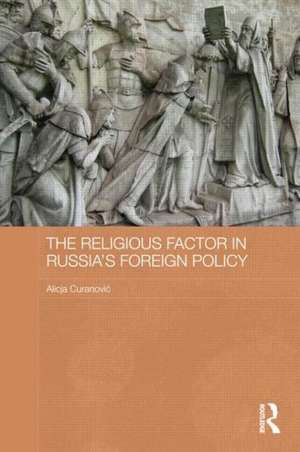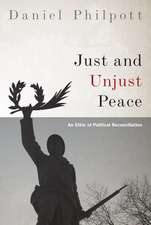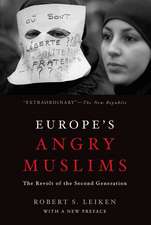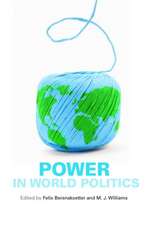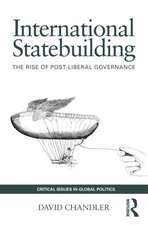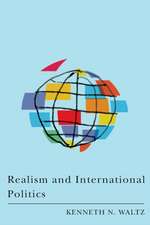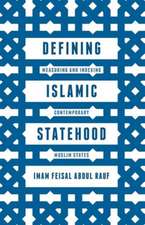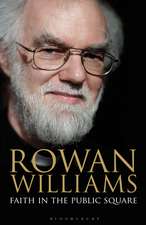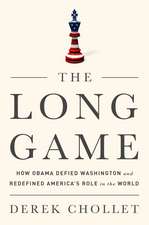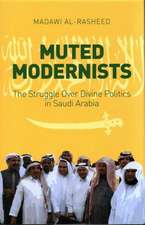The Religious Factor in Russia's Foreign Policy: Routledge Contemporary Russia and Eastern Europe Series
Autor Alicja Curanovićen Limba Engleză Paperback – 15 aug 2014
| Toate formatele și edițiile | Preț | Express |
|---|---|---|
| Paperback (1) | 470.32 lei 6-8 săpt. | |
| Taylor & Francis – 15 aug 2014 | 470.32 lei 6-8 săpt. | |
| Hardback (1) | 1061.84 lei 6-8 săpt. | |
| Taylor & Francis – 31 ian 2012 | 1061.84 lei 6-8 săpt. |
Din seria Routledge Contemporary Russia and Eastern Europe Series
-
 Preț: 309.79 lei
Preț: 309.79 lei -
 Preț: 326.49 lei
Preț: 326.49 lei -
 Preț: 326.15 lei
Preț: 326.15 lei - 9%
 Preț: 1010.71 lei
Preț: 1010.71 lei -
 Preț: 321.03 lei
Preț: 321.03 lei -
 Preț: 302.33 lei
Preț: 302.33 lei -
 Preț: 325.21 lei
Preț: 325.21 lei - 9%
 Preț: 934.70 lei
Preț: 934.70 lei -
 Preț: 318.10 lei
Preț: 318.10 lei -
 Preț: 379.30 lei
Preț: 379.30 lei - 18%
 Preț: 1111.51 lei
Preț: 1111.51 lei - 18%
 Preț: 1058.79 lei
Preț: 1058.79 lei - 25%
 Preț: 824.70 lei
Preț: 824.70 lei -
 Preț: 464.54 lei
Preț: 464.54 lei - 18%
 Preț: 950.71 lei
Preț: 950.71 lei - 18%
 Preț: 1168.76 lei
Preț: 1168.76 lei - 24%
 Preț: 130.54 lei
Preț: 130.54 lei - 26%
 Preț: 821.46 lei
Preț: 821.46 lei - 18%
 Preț: 1169.78 lei
Preț: 1169.78 lei -
 Preț: 413.98 lei
Preț: 413.98 lei -
 Preț: 387.49 lei
Preț: 387.49 lei -
 Preț: 406.52 lei
Preț: 406.52 lei - 18%
 Preț: 1059.93 lei
Preț: 1059.93 lei - 18%
 Preț: 1218.26 lei
Preț: 1218.26 lei -
 Preț: 418.13 lei
Preț: 418.13 lei - 18%
 Preț: 1171.89 lei
Preț: 1171.89 lei - 18%
 Preț: 1057.57 lei
Preț: 1057.57 lei -
 Preț: 413.37 lei
Preț: 413.37 lei - 18%
 Preț: 707.96 lei
Preț: 707.96 lei - 18%
 Preț: 1058.65 lei
Preț: 1058.65 lei - 18%
 Preț: 948.84 lei
Preț: 948.84 lei - 18%
 Preț: 706.91 lei
Preț: 706.91 lei - 18%
 Preț: 1059.84 lei
Preț: 1059.84 lei -
 Preț: 488.33 lei
Preț: 488.33 lei - 18%
 Preț: 1056.28 lei
Preț: 1056.28 lei -
 Preț: 390.12 lei
Preț: 390.12 lei - 18%
 Preț: 1053.16 lei
Preț: 1053.16 lei - 18%
 Preț: 1056.28 lei
Preț: 1056.28 lei - 28%
 Preț: 850.91 lei
Preț: 850.91 lei - 18%
 Preț: 1050.78 lei
Preț: 1050.78 lei - 18%
 Preț: 1166.68 lei
Preț: 1166.68 lei - 18%
 Preț: 1058.79 lei
Preț: 1058.79 lei - 18%
 Preț: 1958.23 lei
Preț: 1958.23 lei - 18%
 Preț: 1221.74 lei
Preț: 1221.74 lei
Preț: 470.32 lei
Nou
Puncte Express: 705
Preț estimativ în valută:
90.01€ • 93.62$ • 74.31£
90.01€ • 93.62$ • 74.31£
Carte tipărită la comandă
Livrare economică 14-28 aprilie
Preluare comenzi: 021 569.72.76
Specificații
ISBN-13: 9781138816831
ISBN-10: 1138816833
Pagini: 378
Dimensiuni: 156 x 234 x 23 mm
Greutate: 0.48 kg
Ediția:1
Editura: Taylor & Francis
Colecția Routledge
Seria Routledge Contemporary Russia and Eastern Europe Series
Locul publicării:Oxford, United Kingdom
ISBN-10: 1138816833
Pagini: 378
Dimensiuni: 156 x 234 x 23 mm
Greutate: 0.48 kg
Ediția:1
Editura: Taylor & Francis
Colecția Routledge
Seria Routledge Contemporary Russia and Eastern Europe Series
Locul publicării:Oxford, United Kingdom
Public țintă
PostgraduateCuprins
Introduction Part I. Religious Factor in Russian Policy: Past and Present 1. Evolution of the Role of Religion in the History of The Russian State 2. Religion in Social and Political Life of The Russian Federation 3. Religion in Russian Views on Foreign Policy Part II: "Religious Diplomacy" of The Russian Federation 4. Characteristics of Russian "Religious Diplomacy" 5. Russia’s "Orthodox Brotherhood" With Belarus and Serbia 6. The "Syndrome of Betrayal" In Russia’s Relations with the Ukraine, Estonia and Georgia 7. "Occasional Community": Russian Policy towards Moldova, Romania, Bulgaria, Macedonia and Montenegro 8. The "Long Shadow of Byzantium": Russian – Greek Relations in the Face of Rivalry between the Two Churches 9. "Between Fear and Necessity of Cooperation": Russian Policy Towards Muslim Countries 10. "Among Us, the Chosen Nations": Tendencies in Russian-Israeli Relations 11. "Neighbourhood Of Giants": The Place of The Russian Federation in the Asian Cultural Space between India and the People’s Republic Of China 12. "There Can Only Be One Rome": Russia’s Traumatic Relations with the Vatican 13. "The Antichrist Lives in the West": The Ideological Burden of Russia’s Policy Towards the United States
Recenzii
"Curanovic's excellent study is a most welcome addition to the field, and i am sure I will be referring to it regularly in my own research. It should be on the shelf of anyone interested in Russian foreign policy in general and the role of religion in particular." - Christopher Marsh, The Russian Review, 2013.
Descriere
This book examines how religion interacts with Russian foreign policy, arguing that religion is an important and neglected factor in shaping Russia’s outlook towards international relations. It surveys the importance of religion in Russian social life - past and present - and considers those attitudes affected by religion – such as Russian nationalism, notions of Slavic solidarity, the divine mission of Russian Orthodox civilisation, Russian imperialism, and Russia’s special approach towards Islam.
